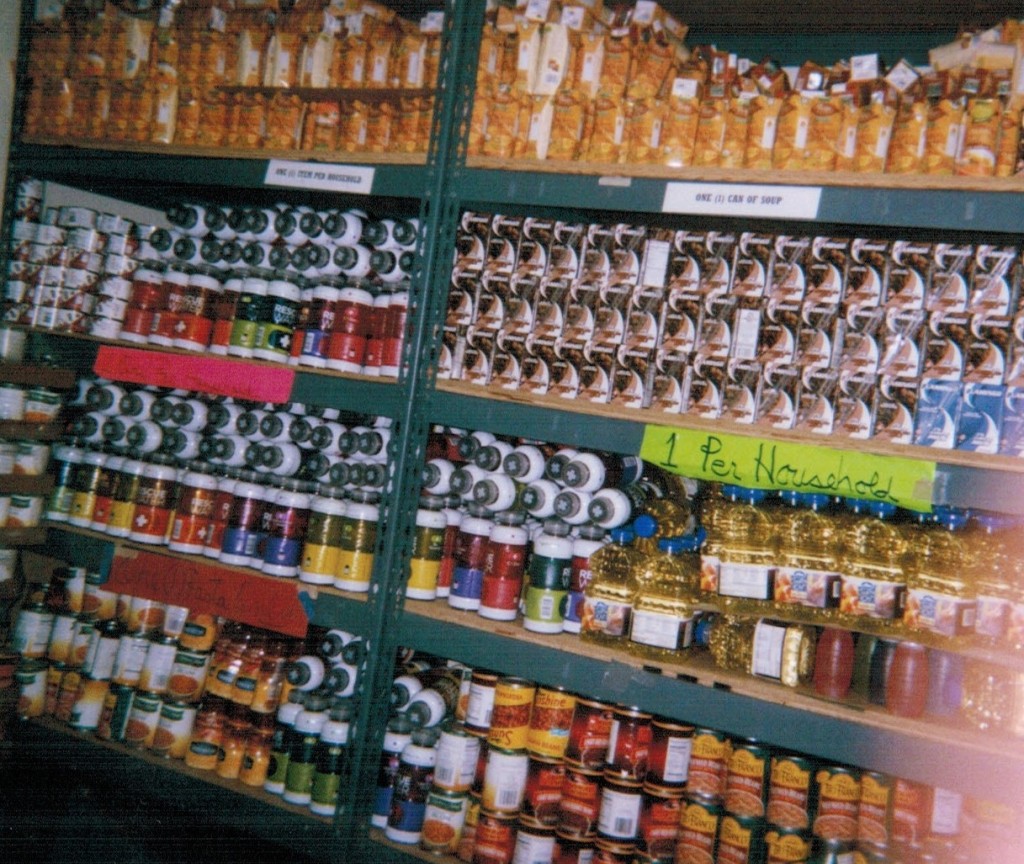Thank You for Bringing HOPE

Thank you for your support throughout the year and for the holidays.
I’m hoping that you can continue to include your “feeding the hungry” activities throughout the coming year! Your donations translate into hot meals, safe shelter, and a reminder to the hungry and unhoused that there are those out there who care.
Your generosity changes lives. Food pantries, soup kitchens, and shelters restore people’s lives.
It takes all of us to support those in need.
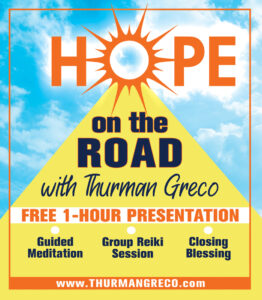

Do you have a crowded closet? Winter clothing needs include:
warm coats
foot wear – especially boots
warm gloves and hats
jeans and pants
sweatpants
long underwear
The items most often resquested: socks
– – – – – – – – –
Thanks for reading this blog post. Please share it on your preferred social media network. Forward it to your friends and relatives.
Find more information about hunger and homelessness on “Let’s Live with Thurman Greco” on YOUTUBE.
www.thurmangreco.com
www.hungerisnotadisease.com
THANK YOU FOR CARING!

Do you want to learn more about hunger and homelessness in America? You can find more info in previous posts on this blog.
I Don’t Hang Out in Churches Anymore – Coming Soon!
 IT’S COMING SOON!
IT’S COMING SOON!
After countless reams of computer paper, dozens and dozens of writing classes, three computers and two copiers, the book about hunger is at the publisher’s!
And, I actually heard the word “done” today! I’m ecstatic beyond words!
Somebody else could have done it with only one computer disaster and one copier blow up. But, I never claimed to be a writer.
This endeavor took years. And, it was worth it. I felt this story needed to be told when I started writing it in 2013 and I’m sticking to my opinion. Hunger in America was then and is now a national event which needs to be shared.
A real Woodstock story, “I Don’t Hang Out in Churches Anymore” tells about the people in the pantry, channels my grandmother, and reveals a few miracles.
I’m proud to say that “I Don’t Hang Out in Churches Anymore” will, within days, be available in paperback and eBook editions on Amazon.
I am already scheduling book signings for this book. If you are in the area, I look forward to seeing you at one near you!
You can purchase this book by going to my website at http://www.thurmangreco.com.
Order your copy, and please share this unbelievably exciting news!
Thurman
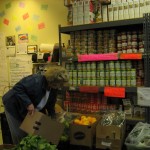
Please share this blog article with your preferred social media network!
SNAP
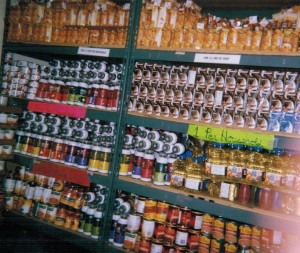 SNAP is important. SNAP will help you if you are having trouble buying groceries.
SNAP is important. SNAP will help you if you are having trouble buying groceries.
SNAP is important for your community, too, because when you are able to get food with SNAP, you will have cash available to help pay your rent or buy gas to get back and forth to work.
Have you, or has someone you know, applied for SNAP? SNAP was formerly known as food stamps.. SNAP is about all that’s left in the way of assistance for people because welfare is shrinking and shrinking and shrinking yet again.
If you are having trouble paying for your groceries, now is a good time to apply. If you’ve applied in the past and were denied, maybe you need to apply again. You may, after all, have answered a question incompletely or incorrectly and were denied this benefit. Try again. You might do better this time around, especially if you or someone in your house is disabled or is a senior with medical expenses.
Some people are reluctant to apply for SNAP because they don’t know if they are eligible. Or, maybe they applied in the past but were denied. Many people don’t know how to apply and are overwhelmed by the application. Some people have never heard of SNAP and think of it as food stamps.
One thing: If you work, you need to know how to meet the work requirements.
Some information is needed to successfully apply for SNAP. This information comes in several categories.
Proof of income is necessary. This comes in the form of pay stubs, social security income information.
An identification is needed. This might be a State ID, passport, birth certificate, etc.
Bills help. This will include medical, heating, water, auto, rent.
Your social security number and the numbers of everyone in your household is necessary.
Dependent Care Costs will help. These include day care costs, child support, attendant for disabled adult.
Contact your local Department of Social Services office to arrange for application assistance. If this doesn’t work for you, contact your Office on Aging or Catholic Charities.
SNAP is an important benefit which will help you if you are having trouble buying groceries.
SNAP is important for your community, too, because when you are able to get food with stamps, you will have cash available to help pay your rent or buy gas to get back and forth to work.
SNAP is important for your household because you’ll be able to get more food with your SNAP card and you won’t be hungry anymore.
This translates to better health.
Thank you for reading this blog post.
Please share this article with your preferred social media network.
Please forward this article to anyone and everyone you know who might be able to have a better life with SNAP.
Thurman Greco
 This book is being published now and will be available soon!
This book is being published now and will be available soon!
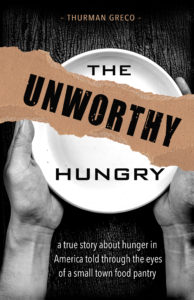 This book will be going to the publisher before the end of the year.
This book will be going to the publisher before the end of the year.
Take $1 – Leave $1
The young musician’s sign said it all:
TAKE $1
LEAVE $1
She sat on the sidewalk in front of Houst the other day, with her guitar box open. True to Woodstock tradition, she was singing for tips. Her sign, her posture, her music really resonated with me. I really feel that we are now fast approaching the point in our country where our residents are divided into two groups:
those who use pantries, soup kitchens
those who do not use pantries, soup kitchens
So, that puts us in the Take $1 – Leave $1 lifestyle.
Food pantries and soup kitchens, through the food distribution process work relentlessly to end hunger. Most people working in pantries or soup kitchens are volunteers who understand they offer hope and sustenance to a community of people living with and affected by hunger and, in some cases, homelessness.
Any amount you can spare will help make the pantry or soup kitchen you support a better place. Please send a donation today. Your gift will make a difference in the lives of people who have little and need a lot. Take $1 – Leave $1
Thank you in advance for your generosity.
Thurman Greco
Thank you for reading this blog. The story is true. The people are real.
Please refer this article to your preferred social media network.
Don’t forget to join the email list.
The Face of Hunger/The Face of Hope
Every Monday, she brings her little granddaughter to the pantry –
Sue, maybe 4, is shy – absolutely beautiful – and still totally unaware of her situation:
White
Mother working 2+ jobs
Not enough to eat
Threadbare clothes
This lovely child takes pleasure in the smallest treats. Today her treat is a can of juice one of the volunteers found that’s not yet dented.
Her grandmother is teaching her to:
stand in line quietly
smile
say “thank you”.
How these mothers and grandmothers can get these little children to stand perfectly still and quiet for the time it takes to go through the line is completely beyond me.
But, back to the story.They get a 3-day supply of food which will last for 7 days, this struggling pair.
She’s always happy visit the pantry. It’s got 2 rooms so their next stop is the produce room where they have apples today.
Garrett and Susanne also keep the place well stocked with children’s books so there will be another treat for her.
When I see this pair, I see the universal grandmother and granddaughter next door. They are us. They are our neighbors. They are our cousins. I am reminded that we do not live in a we/they world. The hungry are us.
I’ve been working in a food pantry for years…certainly long enough to have become hardened to the reality and face of hunger. However, that is not what has happened. If anything, I’m more sensitive to the issues. I now truly believe that humans are not meant to suffer hunger and poverty. We are not meant to turn our heads away from the issue of hunger.
Most poor families in America are working families. The low wages earned by the millions of hungry Americans are not enough to cover the cost of housing, medical care, child care, transportation, clothing and food.
As the Struggling Class begins cutting food because the budget no longer allows it, they begin by cutting out meat. If that is not enough, they go to the second level and cut out meat, vegetables and eat eat only cereals.
Finally, it means cutting out an entire meal every day.
Food Pantries offer the hope of at least not starving to death. When people visit food pantries they can get food which they otherwise could not purchase. This brings hope to us all – not only the hungry but to those who work to appease the situation.
http://www.allianceforpositivehealth.org
http://www.foodbankofhudsonvalley.org
Thank you for reading this blog/book.
Please refer this article to your preferred social media network.
Thurman Greco
Grocery shopping is always a problem for the elderly.
I first met her outside the shed at the Reservoir Food Pantry. A recent widow, I heard her comment “I just never knew how hard it was going to be as a widow.” Her husband died just over a year ago and she’s still making her way toward accepting her new reality.
“I never knew it would be so difficult…being alone like this. I’ll never tell my children I come here. I don’t want them to know.”
As she spoke, she wiped an occasional tear while moving through the pantry line with a group of women, all about her own age. They were choosing corn and apples, squashes, greens, onions, potatoes. As the line snaked forward, she turned her attention to the canned goods: beans, soup, fruits, veggies.
Pat hasn’t made it to the food stamp office in Kingston. For one thing, it’s a good half hour down Route 28. For another, she’s afraid:
of the forms,
the humiliation of being unable to survive on her own,
the long wait in a building she may not even be able to find,
finally, she’s afraid of the whole process which she finds frightening.
Her financial situation isn’t so far from all the other older women in the pantry line. Grocery shopping for the elderly is difficult under the best of circumstances. Getting to the grocery store can be challenging for older people – getting around in the parking lot and going up and down the grocery store aisles is no fun anymore. And, then, when they can’t find what they need, they have to maneuver the muddy parking area and the scary entrance ramp at the pantry. And…we haven’t even discussed the packages yet. They’ve got to be gotten home and in the house (wherever and whatever that is).
Finally, getting high quality, affordable food is more and more difficult as the days go by. And, as difficult as it is for Pat, she’s one of the lucky ones. She’s got a working automobile.
Combine the lack of a working automobile, bad weather, not enough $$$ and you’ve got the makings of a disaster for a senior.
I keep telling everyone who’ll listen that seniors should get their SNAP card, a list of nearby pantries, and their first social security check at the same time. So far, nobody has listened. Of course not. Why should they? We’ve all got gray hair.
Seniors struggle with the big 3:
food
housing
medical expenses.
Forget the extras like clothing. As seniors, we get less, pay more, and go without. When I need something new to wear, I go to the boutique of my closet.
Healthcare costs can be devastating, even to a senior with medicare. Once a person comes down with cancer or other expensive disease, the pocketbook empties pretty fast.
There is real pressure to feed the rising tide of hungry people at every pantry. We get questionnaires periodically from different agencies wanting to know how often we run out of food. How does “weekly” sound?
The Big 3 for pantries include:
high unemployment
widespread poverty
deep cuts in social spending programs.
Pantries, for the most part, are
arbitrary,
subjective,
strongly biased
when it comes to deciding who can and cannot receive food. There are simply too many agencies with too many people standing in line for too little food for any food bank or state office to properly oversee and supervise the selection process.
As far as feeding the hungry, we’re not even coming close to filling the need created by the widespread poverty and deep spending cuts. People in food pantry lines are, in a severe winter, choosing between eating and heating.
Our pantry, housed in a shed, an old green house, and the back of a restaurant is a ragtag emergency food movement which is in reality not emergency at all.
Lines and crowds outside our pantry on Monday afternoons can easily convince any onlooker that the good old U S of A has a food problem.
http://www.reservoirfoodpantry.org
Thank you for reading this blog/book.
Please send a comment.
Please share this article with your preferred social media network.
Don’t forget to join the email list.
Peace and food for all.
Thurman
7 Ways We Use Food Pantries
Food Pantries feed the hungry…and very successfully at that, actually. After all, there are very few stories right now about starving people dying in the streets. We Food Pantry volunteers can pat ourselves on the back for that, at least.
But, so much more happens in a Food Pantry beyond feeding the hungry.
For starters, thousands of volunteers are kept gainfully occupied and off the streets as we (wo)man the pantries.
The United States Department of Agriculture disposes of thousands and thousands of pounds of surplus foods every year in Food Pantries. Unfortunately, though, the USDA seems to have a somewhat embarrassed attitude about the distribution of agricultural surpluses. Anybody who thinks about it quickly realizes that it’s impossible to grow just exactly what we need every year. It’s much better to have too much than too little. So, the USDA needs the Food Pantries to dispose of this surplus. Sure beats hauling it off to the landfill.
Thank you USDA! I just wish you felt better about the job you do.
Supermarkets use Food Pantries to dispose of food they can’t sell. By donating produce,
baked goods,
meats,
packaged shelf staples,
grocers avoid dump fees, discourage dumpster divers, accrue tax savings, and tell the world about how many thousands of dollars they donated to feed the hungry.
Churches throughout this country feed the hungry in Food Pantries located in their basements. That is, all except for the famous St. Gregory’s Episcopal Church in San Francisco where Sara Miles put the pantry on the altar. She subsequently wrote a book about it entitled “Take This Bread”. I hope you get a chance to read it.
Congregations label their Food Pantries as outreach but I don’t buy into that concept. What we’re all doing, really, is celebrating the enormous abundance existing in this country…in this world…on this planet.
Environmentalists use Food Pantries to divert food bound for the landfill. It’s amazing when you think about it. Several million people in our country are prevented from starving to death when they shop at a Food Pantry and take home produce, dairy products, meats, baked goods, shelf staples that would otherwise have ended up at the landfill.
Schools throughout our fair nation distribute food to children to take home on the weekend. The Backpack Programs offer food to children who have none in their households.
It’s a real ego trip for whole segments of our society. Everyone feels all warm and fuzzy about food donated to Food Banks. This includes farmers, grocers, food manufacturers, restaurants, bakers, religious and civic institutions feeding the hungry, and, of course, the people who read the stories about the generosity of these businesses.
This warm and fuzzy feeling we all get when we realize which businesses are contributing to feeding the hungry rubs off positively on Food Banks. They, thankfully, are very influential charities as a result. Food Banks rank right up there with hospitals, the United Way, and the Y.
And, it’s all good. Food Banks need the $$$ to keep the whole industry going. The demand for the food keeps growing and growing because the minimum wage jobs don’t pay enough $$$ to allow workers to buy groceries. SNAP benefits get whittled away each year. There’s not much left except the Food Pantry.
Thank you for reading this blog/book.
Please send a comment.
Please refer this article to your preferred social media network.
Don’t forget to join the email list.
http://teamnutrition.usda.gov
www.feedingamerica.org/officialsite
www.reservoirfoodpantry.org
Thurman Greco
There is no excuse for anyone in our country to be hungry.
“Thanks for dropping by this afternoon. We’re going to open the pantry in just a few minutes. Please bear with us while I get this shelf stocked.” It was only 1:00 and the place was already crowded. What’re we going to do when there’s a freezing rain, I thought.
“Okay. Come on in. We’re ready.”
I HONESTLY DON’T KNOW WHAT PEOPLE THOUGHT WHEN THEY FIRST OPENED PANTRIES AND SOUP KITCHENS. I’ve read that the idea was to offer emergency food.
Ever since the ’80s, volunteers at food pantries and soup kitchens have been working to feed people so they won’t be hungry for the coming few days. What was once considered to be a crisis is now a way of life for many people unable to extricate themselves from poverty and destitution. It’s also a way of life for the many volunteers working at soup kitchens and pantries throughout our country.
HUNGER IN AMERICA IS A SHAMEFUL SITUATION FOR THE ENTIRE COUNTRY. There is no excuse for anyone in our country to be hungry.
A fairly common complaint I hear is: “We shouldn’t be feeding these people. This is not solving the problem. There shouldn’t even be pantries.”
I submit to you that we’re facing 2 separate problems. When a person shops at a pantry for a 3-day supply of food, an effort is being made to rescue this person and his/her household from the grip of food insecurity.
OFFERING FOOD IN A PANTRY KEEPS THE PERSON/HOUSEHOLD FROM GOING HUNGRY FOR THE FOLLOWING 3 DAYS. THAT’S 9 MEALS. THAT’S ALL.
Food pantries do not address poverty and destitution in our country. Food pantries cannot address the urgent and ongoing need for:
shelter
job training
job referral
daycare
clothing
transportation
medical attention
adequate wages.
Many people shopping at pantries can get themselves out of the ongoing rut of poverty with help. There’s a huge difference between feeding people a 3-day-supply of food weekly and lifting them out of poverty.
Food pantries are stop-gap measures used to keep hungry people from starving until our leaders in Washington reach viable solutions to the problems created by poverty.
Food pantries assist poor and destitute people use their minimum wage funds to get back and forth to work.
FOOD PANTRIES MAKE SURE OUR POOR AND DESTITUTE SENIOR CITIZENS WILL HAVE ENOUGH TO EAT SO THEY WON’T BE A BURDEN TO THEIR CHILDREN AND GRANDCHILDREN.
Food pantry volunteers are on the front lines of the war against food insecurity. Our concern is making sure there is enough food in our pantry to feed the people coming for help every week. It’s all about food security.
Getting people out of poverty is not an issue for pantry workers at all. We cannot even begin to address this issue at the food pantry level.
As food providers, our situation is labor-intensive, unpredictable, and filled with crisis management situations. We routinely deal with boxes weighing over 40 pounds each, loading docks, and parking lot accidents.
Politicians continually work to remove the safety net offered by SNAP cards, unemployment payments, health care.
One program which doesn’t get as much attention is the Earned Income Tax Credit, which is billed as a program designed to reward the low wage worker. In reality, this subsidizes the employer, who can then pay lower wages without causing the worker so much pain that s/he can no longer afford to work. This program benefits many large corporations. It is a great tool for all big box employers.
Until there is a secure community safety net for the poor and destitute in our country, we will continue to feed a 3-day-supply of food weekly to families/households who don’t make enough $$$ to buy food after they pay for rent and transportation. Their minimum wage paychecks simply don’t last a week.
Every time I serve a 3-day-supply of food to a working person, I am reminded that in our country working people no longer have any value to their corporate employers. They are nothing more than commodities to be exploited.
THE EVER INCREASING NUMBERS OF POOR AND HOMELESS LEADS ME TO BELIEVE THAT WITHOUT FOOD PANTRIES, MANY PEOPLE WILL STARVE.
Thank you for reading this blog/book.
Please refer this article to your preferred social media network.
Please send a comment.
Don’t forget to join the email list.
Peace and food for all.
Thurman Greco

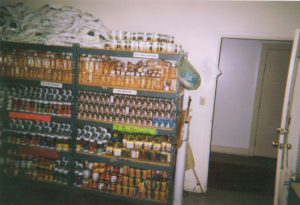

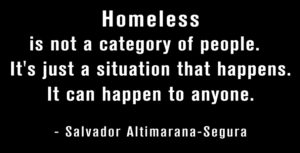
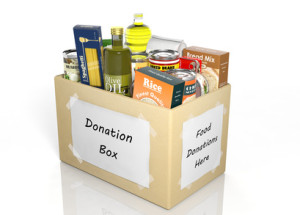 The homeless have problems just like you and me: employment, health issues, disabilities, domestic violence. They just don’t have a roof over their heads.
The homeless have problems just like you and me: employment, health issues, disabilities, domestic violence. They just don’t have a roof over their heads.

